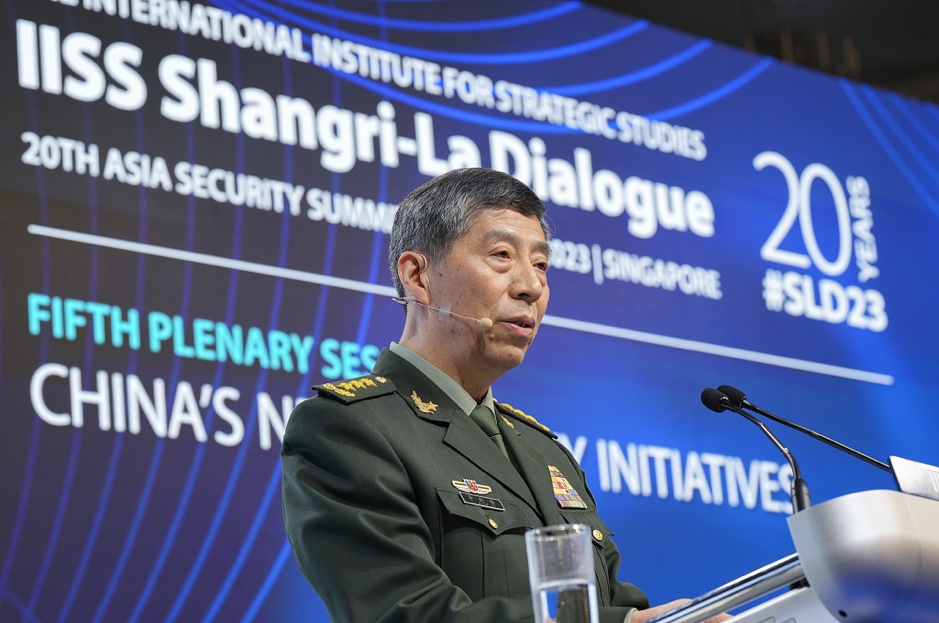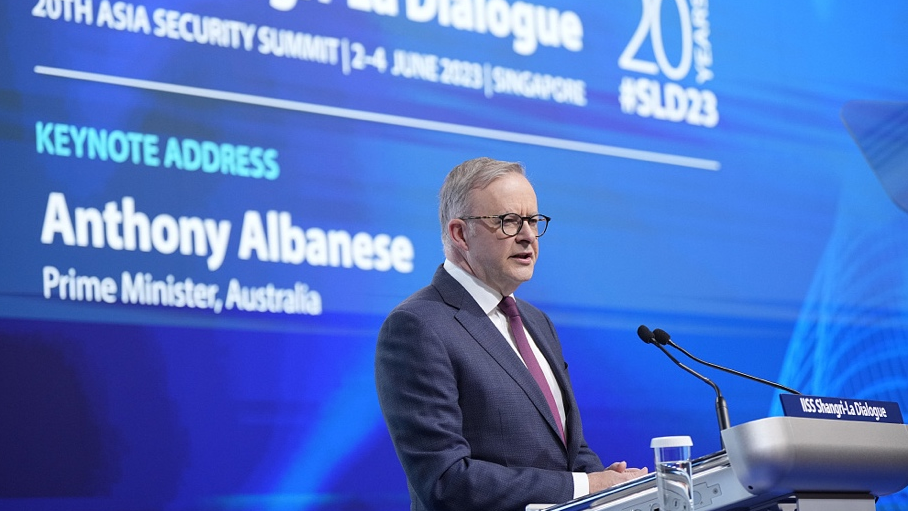
Chinese State Councilor and Minister of National Defense Li Shangfu delivers a speech during the 20th International Institute for Strategic Studies (IISS) Shangri-La Dialogue, Singapore, June 4, 2023. /CFP
Chinese State Councilor and Minister of National Defense Li Shangfu delivers a speech during the 20th International Institute for Strategic Studies (IISS) Shangri-La Dialogue, Singapore, June 4, 2023. /CFP
Editor's note: Kong Qingjiang, a special commentator on current affairs for CGTN, is the dean of the School of International Law at the China University of Political Science and Law. The article reflects the author's opinions, and not necessarily the views of CGTN.
On June 4, 2023, Chinese State Councilor and Minister of National Defense Li Shangfu delivered a long-awaited speech at the 20th Shangri-La Dialogue in Singapore.
He recalled that in the past some countries recklessly interfered in the domestic and regional affairs of others, resorted to unilateral sanctions and military coercion in relation to these countries, and even incited "color revolutions" and proxy wars in different regions, thus often leaving behind a region destabilized and in chaos. He stressed that no peace can be expected where hegemony and power politics play out, because hegemony is used to imposing its own will on others, prioritizing its own interests over others, and even building its own security on the insecurity of others. He called on the region to prevent this scenario from being replicated in the Asia Pacific region.
Referring to regional tension caused by the emergence of regional blocs such as the QUAD and the possible presence of NATO in the region, he highlighted the risk of self-fulfilling prophecies relating to the attempt of establishing military alliances based on hypothetical threats. He further warned that "in essence, attempts to push for NATO-like (alliances) in the Asia-Pacific is a way of kidnapping regional countries and exaggerating conflicts and confrontations, which will only plunge the Asia-Pacific into a whirlpool of disputes and conflicts."
In this regard, Li offered China's solution, that is, mutual respect and equal treatment, which are key to harmonious coexistence. Emphasizing mutual respect, he said it is important to respect each other's strategic autonomy and development rights.
China's solution is quite practical. The resumption of diplomatic ties between Saudi Arabia and Iran exemplifies how China's initiative on mutual respect and diplomatic communication would contribute to global peace and common development. The Global South has realized this situation, and acknowledges that the time of hegemony will come to an end.

Australian Prime Minister Anthony Albanese delivers keynote address during the opening dinner for the 20th International Institute for Strategic Studies (IISS) Shangri-La Dialogue, Asia's annual defense and security forum, Singapore, June 2, 2023. /CFP
Australian Prime Minister Anthony Albanese delivers keynote address during the opening dinner for the 20th International Institute for Strategic Studies (IISS) Shangri-La Dialogue, Asia's annual defense and security forum, Singapore, June 2, 2023. /CFP
An in-depth analysis of Li's remarks will find that they originated from the "Global Security Initiative (GSI)" concept.
GSI is in response to the complex international security situation and the urgent need of the international community to maintain international peace and security, which lies at the very center of the United Nations. Contrary to what the hegemony did, GSI rejects any interference in the internal affairs of other countries, and urges respect for the development path and social system independently chosen by the people of all countries.
Actually, more and more countries voiced their concerns over the tensions in the region, reflecting collective vigilance from regional countries when facing real risks of division and confrontation. In the speeches of representatives from nations like the Philippines and Indonesia, they expressed their worries about wars and conflicts. Australian Defense Minister Richard Marles said it is possible for U.S. allies to build productive relationships with China.
Cooperation, rather than confrontation, is what China always does and will continue to do. Adhering to multilateralism is not only a prerequisite for achieving universal security in the international community, but also a principle for implementing GSI. At the Shangri-La Dialogue, China proposed its solution, and the solution is self-evident, a token of China's resolve and sincerity to seek equal dialogue and the pursuit of peace, prosperity and stability in the Asia-Pacific region.
Adhering to multilateralism is not only a prerequisite for achieving universal security in the international community, but also a principle for implementing GSI. Egoism, beggar-thy-neighbors and addiction to use of force or unilateral sanctions are not conducive to maintaining international peace and security. Instead, dialogue is the only way to enhance mutual trust, to resolve disputes, and to promote security. In this regard, the Shangri-La Dialogue and other forums are expected to play their part.
In conclusion, in advocating GSI, China is injecting Chinese elements into the reconstruction of global security, and promoting world peace and development within the ambit of international law based on the UN Charter.
Different from "some countries," China practices what it preaches. China has always been working on promoting world peace and development. Its achievements come from the hard work, diligence and creativity of Chinese people, not from aggression, expansion and plunder. China is ready to join hands with all countries on the path towards modernization and create new opportunities for global stability and prosperity.
(If you want to contribute and have specific expertise, please contact us at opinions@cgtn.com. Follow @thouse_opinions on Twitter to discover the latest commentaries in the CGTN Opinion Section.)